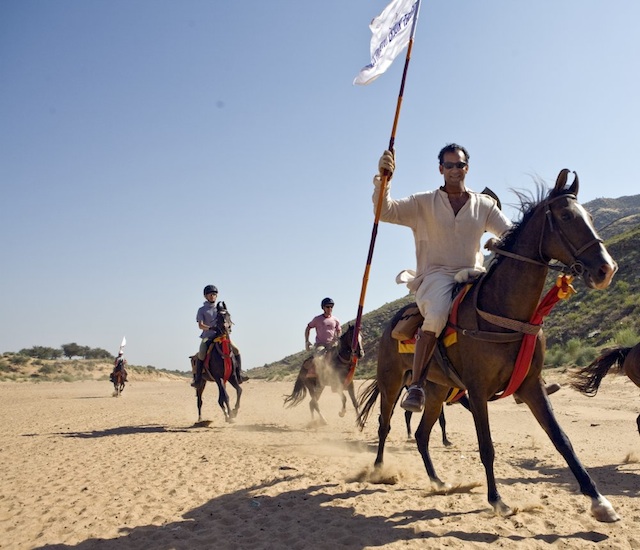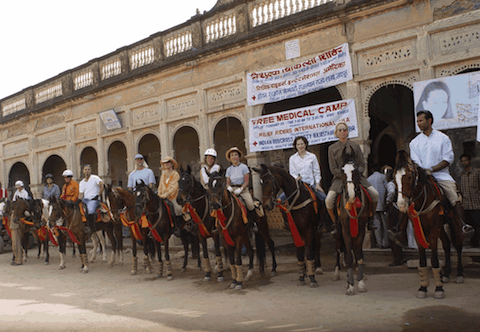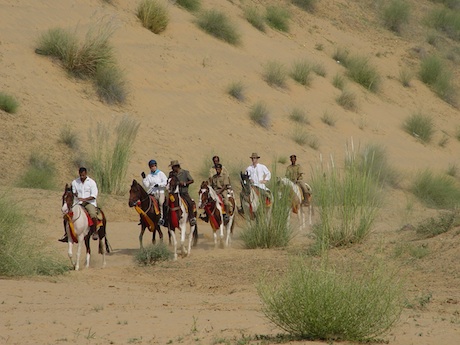
|
|
 |
||||||||||||||||||||
|
|
|||||||||||||||||||||
|
RELIEF RIDERS INTERNATIONAL Remote Indian Villages Benefit from Humanitarian Efforts Delivered via Horseback By Katey Pfeil Over the last six years, one man’s desire to help India’s impoverished citizens, while simultaneously offering adventure-seekers the chance to see a side of India that few tourists ever do, has culminated in an organization that is one-part travel business, and one-part humanitarian effort. In 2004, Alexander Souri embarked on a journey to put his dream of helping others into action. Already a successful film and movie producer, Souri was inspired by the love and compassion of his deceased father to create Relief Riders International (RRI), a unique voluntourism effort that allows travelers the chance to be part of a 15-day excursion through the semi-mountainous and desert region of  southern Rajasthan, bringing aid to five remote villages. southern Rajasthan, bringing aid to five remote villages. The goal of RRI is to bring sorely-needed medical and educational assistance to rural regions of the Thar Desert in Rajasthan via a means of transportation not normally associated with relief work: horseback. Each planned ride is essentially a “care-caravan” atop Marwari horses, and is comprised of a team of medical experts, up to a dozen volunteer participants, and supplies transported on camel back. Along with the team (which includes Souri himself), participants are able to witness breathtaking views, and experience the vibrant and alluring culture of India. Overnight accommodations range from a “comfortable hotel” in Delhi, to a haveli (a traditional Rajput villa), to tented encampments along the route. Riders average 20-30 miles per day, with about 3-5 hours of daily riding time. People in the remote locations visited by RRI have greatly benefited from the free services, such as cataract surgeries (RRI has several mission objectives, including eliminating blindness), pediatric care, treatments for skin and respiratory ailments, and women‘s services. The upcoming 2011 season brings with it a new dental program that will enable villagers to receive free dental work and minor surgeries. Besides medical  and educational programs, RRI has also implemented a livestock distribution program that provides villagers with free goats, and promotes sustainable nutrition practices. So far, Relief Rider’s programs have treated close to 16,000 villagers, including 10,200 children. and educational programs, RRI has also implemented a livestock distribution program that provides villagers with free goats, and promotes sustainable nutrition practices. So far, Relief Rider’s programs have treated close to 16,000 villagers, including 10,200 children.As Souri observes, “We know that the magic of our trips lies in the power of a small group of people coming together with a shared intention to affect positive change for those in need. Each of our Relief Rides is unique, very little is scripted and the experience evolves as each person engages in the mission as a whole.” For Heather Ferrell, a 2009 participant, her RRI experience was nothing short of powerful. "I realized the power of this trip lay in stepping into the unknown, relinquishing all fears and letting the journey unfold as it would,” says Ferrell. “I came back feeling more alive.” And former Relief Riders’ participant Tim Donhue relays his October 2005 experience this way: "I have traveled to many exciting, beautiful and interesting places; however, my Relief Ride was without a doubt the most fascinating, exciting, interesting and rewarding trips I have ever taken.” It’s the belief of RRI that participants seeking this type of  positive and life-changing travel option will find themselves “creating meaningful interactions between themselves and local residents.” Based on their own personal life experiences, everyone who participates is assigned responsibilities such as organizing the caravan, volunteering with the medical team, or helping to distribute supplies or goats; so everyone has a chance to lend a hand regardless of their skill set. positive and life-changing travel option will find themselves “creating meaningful interactions between themselves and local residents.” Based on their own personal life experiences, everyone who participates is assigned responsibilities such as organizing the caravan, volunteering with the medical team, or helping to distribute supplies or goats; so everyone has a chance to lend a hand regardless of their skill set.A New Years’ Relief Ride is scheduled for December 28th, 2010, with two other rides scheduled on January 25th and February 23rd of 2011. The Sardar Samand ride scheduled in February will beckon Relief Riders for the first time to cross the 3,300 foot Aravelli mountain range, where incredible vistas are unavoidable. Although horseback riding is the main mode of transportation during the rides, riders of all levels are welcome; however, participants should count on traveling the daily average of 20-30 miles per day, with stops for three meals each day. (As a convenience, arrangements can be made for non-riders to accompany the group in the caravan.) The cost of participating in this unique humanitarian effort is just under $7,000USD, and includes all meals, lodging, scheduled entertainment and inland transfers to and from the airport. Airfare to and from designated arrival/departure airports in India is not included. FAST FACTS Relief Riders International P.O. Box 615 Great Barrington, MA 01230 329-5876 www.reliefridersinternational.com Photos courtesy of Relief Riders International |
|
|
|
|
| Site Map |